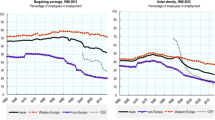Abstract
This paper examines the current state of play in New Zealand’s industrial relations policy following the first general election under a system of proportional representation. The implications of the new Coalition Government’s policy statements are examined in light of the current outcomes under the Employment Contracts Act. It is concluded that radical reforms, and therefore radical changes, are unlikely. With the exception of the role of the Employment Court, institutional arrangements and bargaining outcomes under the Employment Contracts Act have become reasonably stable and are unlikely to be radically altered. The role of the Employment Court and to a lesser extent the Employment Tribunal is under threat and a more gradual move towards further liberalization of the labor market through changes to personal grievance procedures and bargaining process requirements cannot be ruled out.
Similar content being viewed by others
References
Alliance. Today’s Work: Alliance Workplace Relations Policy. April 1996.
Anderson, Gordon. “Collective Bargaining after Ivamy.” Butterworths Employment Law Bulletin 5 (August 1996): 80–83.
—. “The Coalition Government’s Policy on Industrial Relations.” Butterworths Employment Law Bulletin 2 (March 1997): 28–29.
Awatere-Huata, Donna. “Give Workers the Power.” Paper presented at Labour-Management-Govemment Relations in an Era of MMP. Wellington: Plaza International Hotel, March 20, 1997.
Baird, Charles. The Employment Contracts Act and Unjustifiable Dismissal: The Economics of an Unjust Employment Tax. Wellington: New Zealand Business Roundtable and the New Zealand Employers Federation, 1996.
Birch, Bill. Media Statement. 23 April 1991.
Boston, Jonathan, Stephen Levine, Elizabeth McCleay, and Nigel Roberts. New Zealand under MMP: A New Politics? Auckland: Auckland University Press, 1996.
Bradford, Max. “What Happens Now?” Keynote address to 11th Annual IIR Industrial Relations Conference. Auckland: Carlton Hotel, March 3, 1997.
Brook, Penelope. “New Zealand’s Employment Contracts Act: An Incomplete Revolution.” Policy (Spring 1991): 6–10.
Crawford, Aaron, Raymond Harbridge, and Kevin Hince. “Unions and Union Membership: Annual Return for 1995.” New Zealand Journal of Industrial Relations 21 (August 1996): 188–93.
Dannin, Ellen. “Consummating Market-Based Labour Law Reform in New Zealand: Context and Reconfiguration.” Boston University International Law Journal 14 (Fall 1996): 267–318.
Department of Labour. Report of the Department of Labour (Te Tari Mahi) for the Year Ended 30 June 1996. Report to the House of Representatives (October 1996a).
—. 1996 Post Election Brief. Wellington: Department of Labour, October 1996b.
Epstein, Richard. Employment Law: Courts and Contracts. Wellington: New Zealand Business Roundtable, 1996.
Harbridge, Raymond. Labour Market Regulation: Trends in New Zealand. Mimeo prepared for ILO’s World Employment Report, 1994.
—. “Minimum Adult Wage.” The Employment Contract 19 (December 1996): 4–5.
—, and Aaron Crawford. “The Employment Contracts Act and Collective Bargaining Patterns: A Review of the 1995/96 Year.” In Raymond Harbridge, Aaron Crawford, and Peter Kiely, eds. Employment Contracts: Bargaining Trends and Employment Law Update 1996. Wellington: Industrial Relations Centre, Victoria University of Wellington, 1996, pp. 5–52.
—, and Honeybone, Anthony. “External Legitimacy of Unions: Trends in New Zealand.” Journal of Labor Research 17 (Summer 1996): 425–44.
—, and Kiely, Peter. “Activism and Passivism: The Role of the Judiciary in New Zealand’s Employment Contracts Act.” Canadian Labour and Employment Law Journal 3 (1995): 437–60.
Harris, Peter. “The Two Faces of Employment.” Employment Today 30 (March 1997): 13–14.
Haworth, Nigel and Stephen Hughes. “Under Scrutiny: The ECA, the ILO and the NZCTU Complaint 1993-1995.” New Zealand Journal of Industrial Relations 20 (August 1995): 143–62.
Henare, Tau. New Zealand First Policy Release: Industrial Relations, New Zealand First, September 1996.
Hughes, John. “Personal Grievances”. In Raymond Harbridge, ed. Employment Contracts: New Zealand Experiences. Wellington: Victoria University Press, 1993, pp. 89–133.
International Labour Organisation. Final Report of the Committee on Freedom of Association on the Complaint against the Government of New Zealand Presented by the New Zealand Council of Trade Unions. Case No. 1698. Geneva, ILO, 1995.
Kerr, Roger. “Obstacles to Employment and Productivity Growth in New Zealand’s Labour Market.” Address to 11th Annual IIR Industrial Relations Conference. Auckland: Carlton Hotel, March 3, 1997.
Kiely, Peter. “Employment Law Update.” In Raymond Harbridge, Aaron Crawford, and Peter Kiely, eds. Employment Contracts: Bargaining Trends and Employment Law Update 1996. Wellington: Industrial Relations Centre, Victoria University of Wellington, 1996, pp. 53–77.
Kiely, Peter, and Caisley, Andrew. “The Legal Status of Bargaining Under the Employment Contracts Act 1991: A Review of Recent Cases.” In Raymond Harbridge, ed. Employment Contracts: New Zealand Experiences. Wellington: Victoria University Press, 1993, pp. 53–69.
New Zealand Herald. “Review May Seal Fate of Employment Court,” March 6, 1997, p. 16.
Robertson, Bernard. The Status and Jurisdiction of the New Zealand Employment Court. Wellington: New Zealand Business Roundtable and the New Zealand Employers Federation, 1996.
Sloan, Judith. Towards Full Employment in New Zealand. Wellington: New Zealand Business Roundtable, 1994.
State Services Commission. Information provided by the Public Service in Response to Questions from Political Parties Involved in the Coalition Negotiations. Wellington: State Services Commission, 1997.
The Coalition Agreement between New Zealand First and the New Zealand National Party, December 10, 1996. Full text version available via internet at http://www.executive.govt.nz/coalition/.
Walsh, Pat and Ryan, Rose. “The Making of The Employment Contracts Act.” In Raymond Harbridge, ed. Employment Contracts: New Zealand Experiences. Wellington: Victoria University Press, 1993, pp. 13–30.
Wilson, Marie and Enright, Allison. “New Zealand’s Workforce Policy: Reflections on Fairness in the 1990s.” In Andrew Sharp, ed. Leap into the Dark: The Changing Role of the State in New Zealand since 1984. Auckland: Auckland University Press, 1994, pp. 125–45.
Author information
Authors and Affiliations
Additional information
This research was funded by a grant from Public Good Science Fund administered by the Foundation for Research, Science and Technology (FRST Contract: VUW F514).
Rights and permissions
About this article
Cite this article
Crawford, A., Harbridge, R. Eternal legitimacy of New Zealand trade unions: An update. J Labor Res 19, 711–721 (1998). https://doi.org/10.1007/s12122-998-1057-4
Issue Date:
DOI: https://doi.org/10.1007/s12122-998-1057-4




